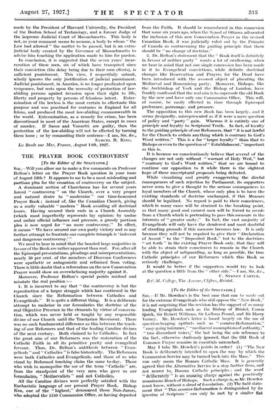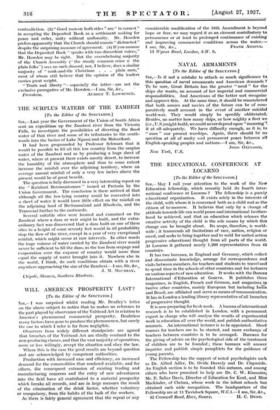[To the Editor of the SPECTATOR.] SIR,—If Mr. Howden's is
the best ease that can be made out for the extreme Evangelicals who still oppose the " New Book," it is not surprising that the revision has the support of so many leading Evangelicals such as the Bishop of Bristol, Canon Quick, Sir Robert Williams, Sir Lulham Pound, and Sir Harry Verney. Mr. Howden's letter is based largely on the use of question-begging epithets such as " counter-Reformation," "easy-going tolerance," "mediaeval assumptions of authority," " two discordant voices," the last being the sole reference to the fact, otherwise studiously ignored, that the Old Book of Common Prayer remains in essentials untouched.
May I take Mr. Ilowden's points in order? • (1) "The New Book is deliberately intended to open the way by which the Communion Service may be turned back into the Mass." This can only mean the Roman Catholic Mass. It is generally agreed that the Alternative Service is a step further from, and
not nearer to, Roman Catholic principles : and the word " deliberately " is an amazing charge against the practically unanimous Bench of Bishops. Such a charge is, as Mr. Howden Must know, without a shred of foundation. (2) The bald state- ment that " This counter-Reformation is distinguished by its ignoring of Scripture " can only be met by a similar flat
contradiction. {8) " Good men on both sides '-' are " in earnest" in accepting the Deposited Book as a settlement making for peace and order, unity without uniformity. Mr. Howden prefers apparently that the Church should remain -" districted" despite the surprising measure of agreement. (4) If you assume that the Deposited Book " speaks with two discordant voices," Mr. Howden may be right. But the overwhelming majority of -the Church Assembly (" the sturdy common sense o the plain folks ") sees no such discord, nor, I believe, does a similar majority of " rank-and-file Christians . . . plain men," most of whom still believe that the opinion of the leaders carries great weight. " Truth and liberty "--especially the latter—are not the exclusive prerogative of Mr: Howden.—I am, Sir, &c.,



































 Previous page
Previous page